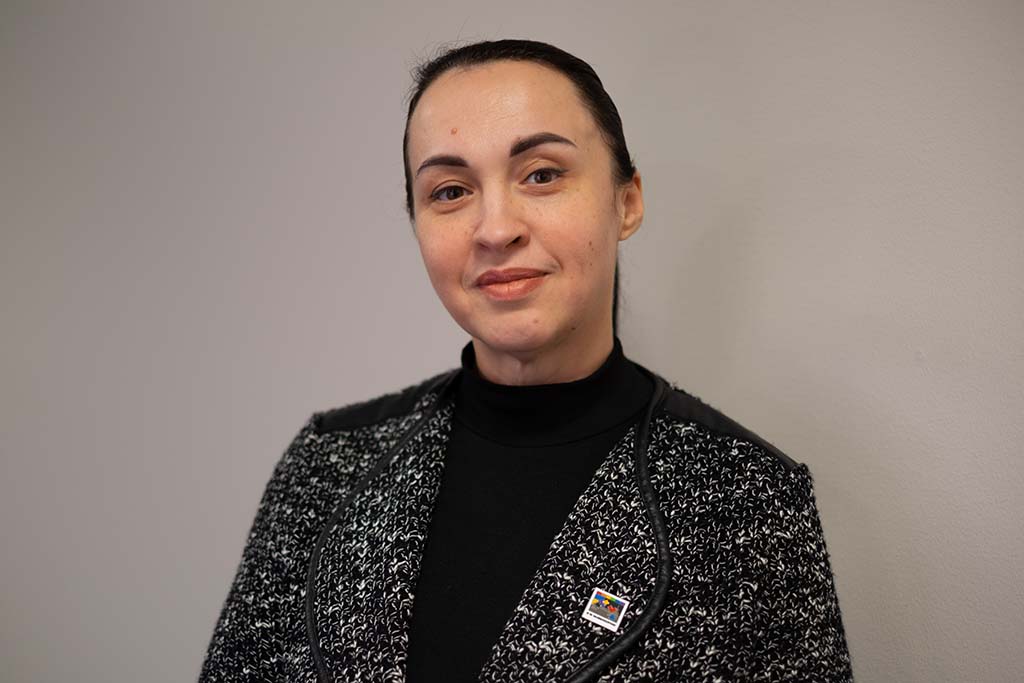Documenting sexual violence in Ukraine
Women’s rights organisation Slavic Heart has worked tirelessly to keep reaching women in need in eastern Ukraine. They are receiving reports of sexual violence as a weapon, but believes that it is only the tip of an iceberg.

When Russia invaded Ukraine in February 2022, women’s rights organisation Slavic Heart was flooded with requests from women in need of assistance. Nataliia Kyrkach is one of the activists working tirelessly to help women in different territories.
“Our support needs to be very complex because women are very different and so are their needs. The most important thing right now is for women to have the opportunity and possibility to restore their lives in a psychological, economical as well as social aspect,” says Nataliia.
Many areas in Ukraine have been destroyed and looted and one of the biggest challenges for the organisation has been to be able to perform their work in a safe way. Nataliia, who has a leading role in Slavic Heart, has been struggling not to lose staff.
“The psychological load is immense. It’s hard to say which challenge is the hardest for us, but I can tell you that every day we have a new one and they are occurring so quickly.”
Humanitarian aid, emergency relief and psychological support continue to be desperately needed.
Solidarity and emergency funds
At the time of the invasion, many of the organisations Slavic Heart had cooperated with left the area in eastern Ukraine. Kateryna Khaneva, also a team member at Slavic Heart, was one of the activists who stayed and continued to work in the eastern territories.
“We felt helpless, vulnerable and insecure, but we didn’t want to abandon the communities. We continued on a voluntary basis and were able to provide support to women in need,” says Kateryna.
Finally, Kateryna couldn’t stay. It wasn’t safe. Through The Kvinna till Kvinna Foundation’s emergency fund, she was able to relocate together with her family to relative safety in another part of the country. Through the grant she also assisted pregnant women and women with health issues.
The urgent support provided by the emergency fund was welcome and much needed.
“When the city was bombed and activists were required by other donors to fill out forms, this kind of unconditional support was able to save lives. It may have seemed like a small grant, but it saved my life and that of at least a dozen other people,” says Kateryna.
Throughout the invasion, Slavic Heart has managed to maintain their contact with women in different part of Ukraine and abroad.
“The solidarity of women is incredible, I’ve always known that, but to see the feminist community which has emerged in Ukraine now is powerful. It’s a source of survival and support, and for so many women right now, that’s the only thing they have to hold on to,” says Kateryna.
Documenting the sexual violence
The team at Slavic Heart also sees numerous cases of sexual violence committed against women and children.
“Unfortunately, since it’s happening right now, we can’t share a lot of information, but yes, our enemies are using rape as one of their weapons to try to defeat us. We’ve seen very severe cases, and the most difficult ones are when it happens to children,” says Nataliia.
For Slavic Heart, the work to document and raise awareness about the issue has only begun.
“We don’t know a lot about these cases yet. We look at it as the tip of an iceberg since it’s very taboo to talk about. Many of the territories that have been occupied are rural village areas and the level of awareness is low. Few are talking about it or asking for help. There are probably plenty of cases that have happened that we will only learn about in many years to come,” says Nataliia.
“We need to inform survivors and victims that these kinds of war crimes don’t have an expiration date. All criminals need to face the consequences, so it is extremely important to document all cases,” she continues.
Kvinna till Kvinna has supported women’s rights in Ukraine since 2014. When Russia’s full-scale invasion began in 2022, Kvinna till Kvinna activated our emergency fund to provide urgent support to women’s rights organisations and individual women human rights defenders in and from Ukraine in their work to help women exposed to violence, displaced women and families in need of immediate support. Learn more about our work in Ukraine »